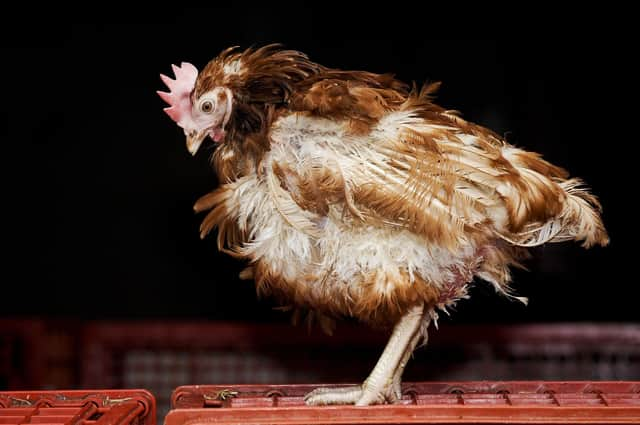Scotland could be first part of UK to ban laying hens being kept in cages


Scotland could become the first part of the UK to ban egg companies from keeping their chickens in cages.
The Scottish Government has just announced a new consultation on banning the use of cages to house hens involved in egg production.
Advertisement
Hide AdAdvertisement
Hide AdAnd agriculture minister Jim Fairlie said if it was implemented Scotland would be “leading the way in improving the welfare of animals by being the first UK nation to ban the practice”.
The consultation comes after the use of battery cages for birds was banned in the UK at start of 2012.
However, there are still more than 1.1 million chickens in Scotland kept in “enriched cages”, which provide birds with more room to nest, roost and scratch than the smaller battery cages.
A survey in 2020 found that almost nine out of 10 people (88 per cent) in the UK believe that using cages in farming is cruel, with more than three quarters (77 per cent) supporting a complete ban on their use.
The Scottish Government’s preference is for a ban on the installation of new cages from 2023, with this followed by a complete ban on keeping birds in enriched cages from 2034.
Ministers believe this option “most effectively balances improvements in bird welfare and ensures sustainability for the laying hen sector”.
But the consultation also seeks views on banning the use of enriched cages from 2030, as well as a non-regulatory option, which would see shops and caterers to commit to stop selling and using eggs from birds kept in enriched cages by 2034.
Mr Fairlie said the Scottish Government’s most recent programme for government had included commitments “to improve the welfare of laying hens to ensure their confinement does not negatively impact their normal behaviours”.
Advertisement
Hide AdAdvertisement
Hide AdHe stated: “Significant progress has already been made in recognising the importance of animal welfare – both in government policies and the demand from the public in the choice they make when shopping.
“If implemented, the ban would be another example of Scotland leading the way in improving the welfare of animals by being the first UK nation to ban the practice.”
Comments
Want to join the conversation? Please or to comment on this article.